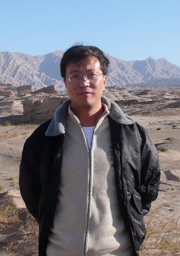People
Liu Zhen
Liu Zhen

Professor
Studied indolgy, tibetology and sinology in the Department of “Indologie und Iranistik” at Universität-München” in Germany 2001-2008. In 2001 the M. A. degree was awarded with the thesis, Das Maitreyavyākarana - Ein Vergleich der verschiedenen Fassungen mit einer Übersetzung des Sanskrit-Textes (The Maitreyavyākarana - A Comparison of the Different Versions with a Translation of the Sanskrit Text). In 2008 the Ph. D. degree was awarded through the dissertation, Versenkung und Askese. Eine neue Sanskrit-Quelle zur Buddha-Legende (Meditation and Asceticism - A New Sanskrit Source for the Buddha Legend). Now professor in the National Institute for Advanced Humanistic Studies, Fudan University. His research specialties are: Veda and Vedic literature, Comparison between Chinese and Indian literature, Indian Mahā- and Hīna-yāna Buddhism, Comparison of Indian, Tibetan and Chinese Buddhist documents, Sanskrit manuscripts and Indian and Central Asian art.
During the study in Germany, my Master and Doctoral theses both concentrated on the original Sanskrit manuscripts of Hlnayana Buddhism on the North route, which is also the research focus of my tutor. After joining the National Institute for Advanced Humanistic Studies, I find that this theme coincides with the research guideline of “viewing China from the Periphery” prevailing in the institute as well as the task undertaken by the Workshop for Intersecting Cultural History.
As an Indologist, my research preference should not only result from personal sens du goût, but also follow the demands of disciplinary development in China. Therefore based on the research specialty acquired in Germany, I will pay more attention to the study of Buddha’s Legend in order to clarify the underlying developmental trace of Buddhist intellectual history. Due to the higher enthusiasm for Mahayana Buddhism in China, I am now also engaged in the study on manuscripts of Mahayana Buddhism. In addition, I am going to publish some scholarly works about translation and introduction of Vedas, Jainism and Indian art. However, according to the academic criteria in the whole world, my anticipated works might weigh nearly nothing and in China they would be surpassed after several years — and indeed I hope it will be realized soon. Besides, the study on Indian Art will, to my great joy, correspond with the study on Chinese history of art in the institute.
In addition to Indology and Buddhism study, I will work on Tibetology and Iranian Studies. Alongside my research I am also devoted to teaching by means of language courses, reading seminars and introductory courses about disciplinary basics. I would feel greatly rewarded if my limited efforts ever contribute to the development of corresponding disciplines and education of students.